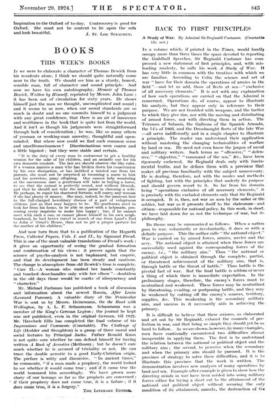BOOKS
THIS WEEK'S BOOKS.
IF we were to elaborate a character of Thomas Bewick from his woodcuts alone, I think we should quite naturally come near to the truth. We should see him as a sturdy, honest, sensible man, full of character and sound principle. And now we have his own autobiography; Memoir of Thomas Bewick, Written by Himself, reprinted by Messrs. John Lane ; it has been out of circulation for sixty years. He shows himself just the man we thought, uncomplicated and sound ; and it seems to us now, when our moral standards are so much in doubt and no one commits himself to a judgment with any great confidence, that there is an air of-innocence and worthiness in the book that is' quite lost-from the world. And it isn't as though his judgments were straightforward through lack of consideration ; he was, like so many others of yeoman or working-man ancestly; thoughtful and open- minded. But where now could we find such common sense
and unselfconsciousness ? Discriminations 'were coarse and a little bigoted ; but' they were stable and certain.
" It is- the duty 'of every man to endeavour- to get a healthy woman for- the sake of his children, and an amiable one for his own domestic comfort. The fair sex should observe -the like rules. if a woman marries a- man who has broken down his constitution by his own dissipation, or has imbibed- a tainted- one from his parents, she must- not be surprised at becoming a -nurse to him and his nerveless; puny offspring: One- cannot help wondering at the uncommon care a gentleman will take in buying a horse, to see that the animal is perfectly sound, and without blemish, and that he-should not take the same pains-in choosing a wife'. He perhaps, to repair his shattered fortune; will marry-any woman if she has plenty of money. She may, indeed, be the innocent heir to the full-charged hereditary disease of a pair of voluptuous citizens, just as that may -happen to be. NO gentleman need to look far from his home; to be able to meet-with a helpmate, pos- sessing every- requisite to make him happy ; but, if he cannot meet. with such a one, or cannot please himself in his own neigh- bourhood; he had better travel in search of one from Land's End to John o' Croat's House, than not to get a- proper partner for the mother of his children."
And-now 'turn from- that to a publication of the Hogarth Press, Collected Papers, Vols. I. and II., by Sigmund Freud. This is one ofthe most.valtiable translations of Freud's-work : it giVes an opportunity of seeing .`.• the gradual formation and confirmation of his views: it proves' again that the science, of psycho-analysis is not haphazard, but empiric, and that its.. development has. been steady and cautious. The change in 'atmosphere from old Bewick's time-is complete.
" Case woman- who. washed her hands constantly
and toadied: doorchandlen only with her elbow "—doubtless in the old. days those would' be-marks or idiosyncrasy and " character:" Mr. Michael. Farbmara has published: a book. of discussion and information- about- the newest. Russia, After- Lenin (Leonard Parsone). A valuable: diary of the Peninsular War is. sent us by Messrs. Heinemann, On the Road with Wellington, by A. L.. P. Schaumann. Schaumann was a member of the King's! German Legion ; the journal he kept was not published; even- in .the original German, till 1922. Mr:. Havelock Ellis has- completed; the final volume of his
Impressions and Comments - (Constable). The Challenge of Life (Hodder and Stoughton) is a> group .of three moral and social lectures by Principal. Jacks. Father Ronald Knox is • not quite sure whether he can defend himself for having
written A Book of Acrostics (Methuen) ; but he doesn't care much whether he is-- accused- of triviality or not. He can
trace the double acrostic to a good Early-Christian origin. The preface is witty and discursive. " In ancient times;" he comments, "'if a man made a: prophecy, the world looked to •see whether it would' come true ; and if it came true the world honoured him accordingly. We have grown more chary of our homage so far as the prophets are concerned : if their prophecy does not come true, it is a failure ; if it
does come truer it -is-a. forgery."
THE LITERARY EDIT0116,


























































 Previous page
Previous page